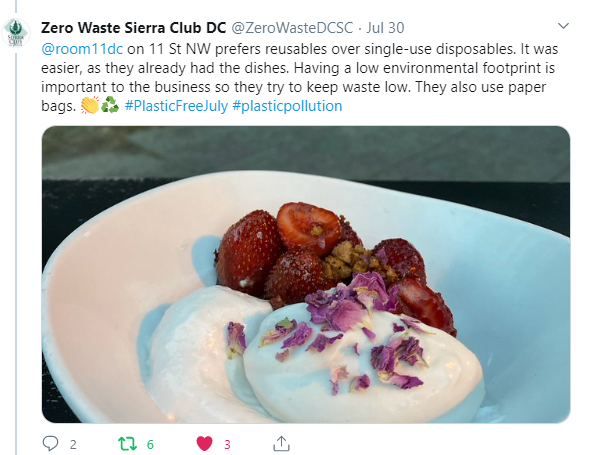Looking for Onsite Dining in DC Restaurants that Hold the Plastic? Check Out These Options
- dcecowomen
- Nov 6, 2020
- 3 min read
Updated: May 12, 2021

By: Susan Schorr
Restaurants have been hit hard by COVID-19. In March, they were ordered to suspend table seating and limited to delivery and take-out. In June, when the Mayor determined the District had reached a sufficient decrease in COVID-19 cases, the Phase II restaurant reopening guidelines required restaurants to operate under strict restrictions for on-site dining. Many beloved establishments have either shut down completely or are hanging on with reduced staff and revenue streams.
It also seems likely that COVID-19 is unleashing a parallel pandemic of plastic pollution. Just think about all those delivery and take-out orders filled in disposable plastic containers! The Phase II guidelines gave eateries the option of serving onsite diners either on disposable or reusable food ware. Restaurants choosing to serve food or drink with disposables in DC were already required to use either recyclable or compostable containers by DC law. But since DC doesn’t have widespread composting, and contamination issues may prevent recyclable containers from being processed properly, restaurants using disposables may be adding to the mountain of trash.
Fortunately, a number of restaurants across the District opted for reusable food ware for on-site dining. The DC Chapter of the Sierra Club celebrated these restaurants as part of the international #PlasticFreeJuly campaign this year, a month-long campaign that encourages everyone to reduce their plastic usage.
We reached out to more than thirty restaurants in all Wards to ask about their reusable practices. Some, we found, were still offering only take-out and delivery, one is only open on weekends for on-site dining but using disposables, while many more were clearly so busy, operating with drastically reduced staff, that they weren’t able to chat with us. We did manage to connect with more than a dozen DC restaurants in Adams Morgan, Barracks Row, Chevy Chase, Columbia Heights, Downtown, Dupont Circle and Petworth to find out why they opted for reusables. We shared their moment-in-time responses on the Chapter’s Zero Waste twitter handle, @ZeroWasteDCSC. Every single restaurant we spoke with — from Lincoln Restaurant to Lavagna– said that they opted for reusables because it saves them money. Serving on reusables means they don’t have to buy disposable plates, cups or utensils or find a place to store them. As Makan explained, going the reusables route has made sourcing much easier especially in these times of disrupted supply chains. That’s because, like Tequila & Mezcal, these restaurants already owned reusable plates, cups and utensils.

Room 11 and The Avenue added that opting for reusables is in keeping with their goal of maintaining a low environmental footprint. Lauriol Plaza said that customers prefer eating on real plates, a sentiment echoed by Duke’s Grocery explaining that reusables provide a more refined dining experience. Dupont Italian Kitchen noted that opting for reusables enabled them to rehire their dishwasher, creating employment during these challenging economic times. In addition to serving on reusables, The Green Zone also reuses liquor bottles to serve water and has replaced paper menus with QR order codes, while Blue 44 sanitizes reusable menus and condiment containers after use. Cinder BBQ and the Parthenon told us they also only provide disposable utensils on request for take-out orders. They realized that because of the pandemic most customers are working from home and don’t need disposable plastic utensils.

These local establishments deserve a lot of credit for taking an eco-friendly approach to reopening. We’re also pleased that the District’s reopening guidelines provided them the opportunity to do so.
Still, there’s more to do. Our next story will focus on the move to reusable takeout container systems and on-going campaigns to convince delivery companies to limit disposable accessory food ware like napkins, utensils and condiment packets.
We hope that you will join the DC Chapter of the Sierra Club in supporting your local restaurants that are holding the plastic, and sharing ideas on what more they can do to stem the tide of plastic during the pandemic. We also invite you to join our Chapter’s Zero Waste Committee.
As a national organization, the Sierra Club’s work recognizes the impacts of plastics in the environment worldwide, especially in our oceans and waterways. It calls for the minimization and elimination of single-use plastics such as cutlery, cups, lids, straws, bags, beverage bottles, cigarette butts, and expanded polystyrene packaging. While biodegradable and compostable plastics and other materials are often presented as an easy alternative for single-use plastics, such substitution perpetuates wasteful production and throw-away practices. These substitute items may also contain toxic chemicals. Single-use plastics (including compostable plastics) must be phased out, and materials must be redesigned for durability and reusability without toxic chemicals.
***

Susan Schorr is a member of the Sierra Club Washington DC Chapter’s Zero Waste Committee where she leads single-use plastic initiatives, and is also a member of the National Reuse Network




Comments